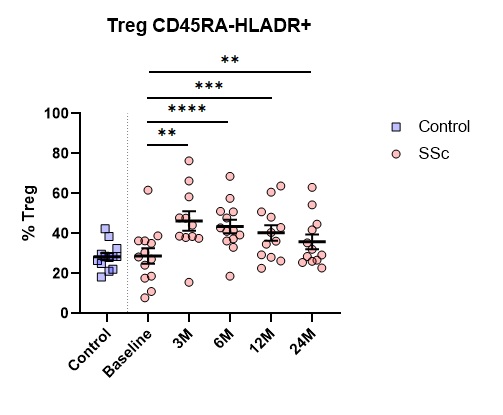Session Information
Date: Sunday, November 7, 2021
Title: Systemic Sclerosis & Related Disorders – Basic Science Poster (0541–0559)
Session Type: Poster Session B
Session Time: 8:30AM-10:30AM
Background/Purpose: Autologous Haematopoietic Stem Cell Transplantation (AHSCT) is an effective treatment for severe systemic sclerosis (SSc). To date, mechanistic studies have indicated possible pro-regulatory and tolerogenic shifts in adaptive immunity. This study aims to describe the changes in key adaptive and innate immune cell populations following AHSCT, with a focus on previously undescribed T cell subpopulations in the transplant setting.
Methods: High-dimensional immunophenotyping of cryopreserved peripheral blood mononuclear cells (PBMCs) from severe SSc patients (n=13) was performed at baseline and 3, 6, 12 and 24 month timepoints post-AHSCT using two custom-designed 18-colour flow cytometry panels. Key adaptive and innate immune populations were examined along with specific subsets within the CD4+ population, including markers for recent thymic egress (CD31) and potential skin-homing (cutaneous lymphocyte antigen, CLA). Data were analysed by one-way ANOVA.
Results: Following AHSCT, there was a decrease in the absolute CD4 count until 12 months, with a sustained increase in the absolute CD8 count and reversal of the CD4/CD8 ratio. CD4+ conventional (Tconv) and CD25+CD127– regulatory (Treg) cells exhibited an early proportional shift from a naïve to memory phenotype. While the percentage and absolute counts of Tregs did not change, there was early and sustained expansion of the highly suppressive CD45RA–HLADR+ Treg subset (% Treg, pre 29.8% vs 24 months 35.88% p=0.008). Furthermore, there was an early and sustained expansion of circulating skin-homing CLA+ Tregs (% Treg, pre 28.4% vs 6 months 39.8% p< 0.001). Recent thymic emigrant (CD45RA+CD31+) CD4+ Tconvs and Tregs recovered by 24 months, indicative of resumed thymic output of both populations. The percentage of CD19+ B cells increased significantly by 6 months (pre 3.3% vs 6 months 5.9% p=0.02). There was an early and sustained increase in the percentage of NK cells to 12 months, particularly the putatively immunosuppressive CD56hi subpopulation (pre 0.5% vs 12 months 1.1% p=0.005). There was no change in circulating basophils or the proportions of activated, intermediate or classical monocytes.
Conclusion: AHSCT results in both early and long term kinetic shifts in adaptive and innate immune cell populations in SSc patients. Although the overall proportion of circulating Tregs does not change, the early and sustained expansion of Tregs with a highly-suppressive phenotype and skin-homing potential may contribute to the clinical remission following AHSCT. In the long term, there is resumption of thymic output of CD4+ Tregs. Harnessing these mechanistic data may inform future targeted therapies for SSc.
To cite this abstract in AMA style:
Penglase R, Visweswaran M, Zaunders J, Girgis L, Ma D, Moore J. Autologous Haematopoietic Stem Cell Transplantation for Systemic Sclerosis Results in Sustained Changes in Immunoregulatory T and NK Cells [abstract]. Arthritis Rheumatol. 2021; 73 (suppl 9). https://acrabstracts.org/abstract/autologous-haematopoietic-stem-cell-transplantation-for-systemic-sclerosis-results-in-sustained-changes-in-immunoregulatory-t-and-nk-cells/. Accessed .« Back to ACR Convergence 2021
ACR Meeting Abstracts - https://acrabstracts.org/abstract/autologous-haematopoietic-stem-cell-transplantation-for-systemic-sclerosis-results-in-sustained-changes-in-immunoregulatory-t-and-nk-cells/

